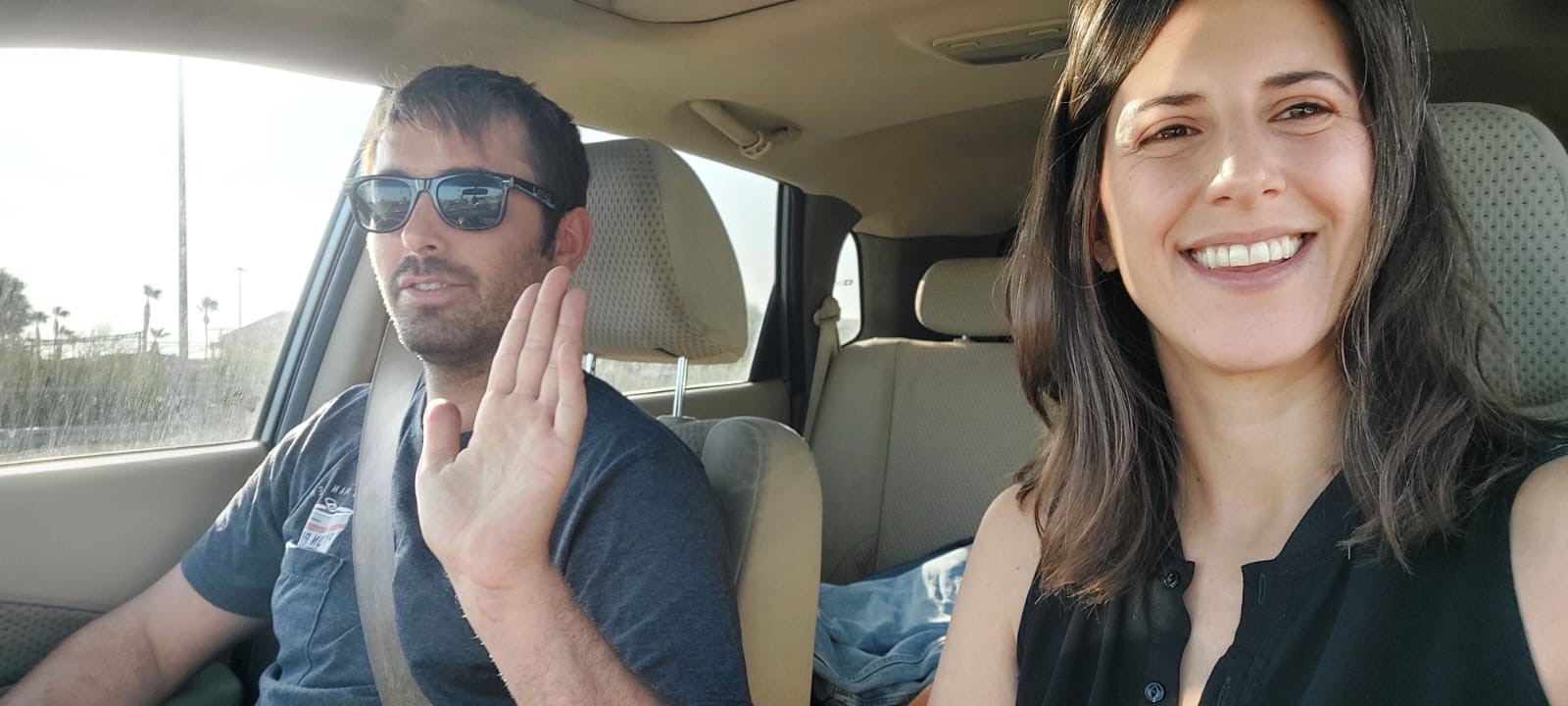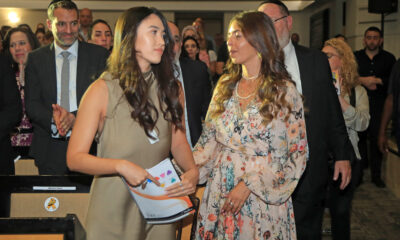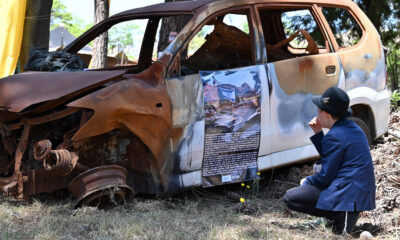
Israel

Last-minute plans save SA olah from massacre
Kibbutz Nir Oz resident and South African olah, Yael Marcus (34), is grieving for kibbutznik friends killed or abducted on 7 October, but she was saved by going away for the weekend for the first time in ages.
Marcus was so attached to her home that she hardly ever spent a night away from it. But on the Shabbat of 6 October, she and her partner, Gil Binovitch, were invited to a meal in Tel Aviv at the home of the person who had made the shidduch between them. Marcus would usually insist on driving home afterwards in spite of the time and distance, but for some reason, she suggested to Binovitch that they visit his parents near Jerusalem after their Shabbat dinner in Tel Aviv and stay there for the weekend. Marcus is still not sure why she made this out-of-character decision, but it probably saved their lives.
Marcus told the SA Jewish Report that after a difficult upbringing in Cape Town, she spent years searching for peace, family, and a place to call home. She finally found that at Kibbutz Nir Oz, where she met her partner, started a new career, and put down roots among people that embraced her as their own.
She lived in a house once occupied by Oded and Yocheved Lifschitz, two of those taken hostage. The Lipschitz couple planted a giant cactus garden next to the house 50 years ago. Marcus has a picture of four-year-old Ariel Bibas playing among the plants. She often borrowed a barbeque from her neighbour, Ofer Kalderon, and called her other neighbour, Yair Horn, a good friend.
All of those people, along with the whole Bibas family and many other people Marcus knows, were taken hostage in Gaza by Hamas on 7 October. She also knew many people murdered by Hamas on that fateful day, including her friend, Tamar Kedem Simantov, who was killed alongside her three little children, husband Johnny, and mother-in-law Carol. “When I heard they were gone, I just screamed,” says Marcus.
On the morning of 7 October, terrorists attacked all of Marcus’s neighbours. Her own house was ransacked. Waking up in Jerusalem, Binovitch told Marcus not to read the kibbutz WhatsApp groups or listen to the news. But as the day went on, it became clear that Marcus could no longer be shielded from what was happening. She read the increasingly desperate WhatsApp messages of those she knew and loved as they were shot, burnt, and suffocated. Meanwhile, in the days after the attack, the chaos was so intense that those who survived initially thought Marcus and Binovitch had been kidnapped.
When Marcus realised what had happened and that she couldn’t go back, “It was a huge trigger,” she says. “Having not had a stable upbringing and now being an orphan, my home in Nir Oz was the most important thing to me. Losing it like that unhinged me. I regressed to my teenage years. I needed to go home.”
Delving into the past, Marcus says, “My mother died when I was 12, just before my Batmitzvah. She had multiple sclerosis. After that, I had a difficult time, but the Jewish community embraced me.” She especially found refuge in the Habonim Dror youth movement. Later, she says Kibbutz Nir Oz reminded her of machaneh, which was one of the reasons it felt like a safe space.
After attending Herzlia and Vega School where she studied brand management, she spent eight years in Hong Kong, working on big brands and losing herself in the city. But for her 30th birthday, she was given some money and booked a flight to Israel. “I was in Yafo on the coast, and the view reminded me of Cape Town. In that moment, I decided to make aliya,” she remembers. Three months later, she officially immigrated to Israel.
“It was at the end of 2019, so that decision also saved me from spending the pandemic in Asia,” she says. In another twist of fate, she took a tour down south to visit a Kibbutz Nir Oz medical cannabis farm. This launched her new career in that industry, and it was also where she met Binovitch, who had also just moved back to Israel from the United States. It was love at first sight.
“We lived quite near the fence of the kibbutz, and it was a simple fence,” says Marcus. “There was just open land and then Gaza. As a South African, I was like, ‘I know what a good fence looks like,’” but no-one else seemed concerned. Still, she ultimately felt safe, even with the rockets flying in from Gaza.
“Life on the kibbutz was structured. You woke up with the sun. You were in tune with the earth,” she says. “It was where I learned to ride a bike and take care of an animal – my cat, Wendy. It was where I healed. It was David Ben Gurion’s vision in action – making the desert bloom. The people were true Zionists and also peaceniks.”
Marcus shares a picture of the kibbutz’s Sukkot celebrations exactly a week before the massacre. The sukkah is lit up with colourful lights as the entire community gathers in the sukkah, a space of warmth, peace, and safety. During the celebrations, Kedem Simantov teased Marcus and Binovitch about when they were going to get married. It was the last time Marcus saw her friend.
“One in four people on Nir Oz was either kidnapped or killed,” she says. “Almost every family was affected.” She’s sharing her story because she hopes it will highlight the desperate situation of the hostages. “They need to come home,” says Marcus. “They need to return the bodies of Judi and Gadi. It’s time for Chaim, David, and Yair to come back. I didn’t know Shiri and Yarden well, but they and their little boys, Ariel and Kfir, need to be here.”
After the massacre, Marcus and Binovitch lived in Tel Aviv, but she found it too traumatic and loud, especially with the many rocket attacks. They then spent time in Caesarea, which was quieter. After that, they joined their Nir Oz community at a hotel in Eilat. Now, the entire community has been moved to new apartment buildings in Kiryat Gat. Though she’s grateful to be there, Marcus says they “need to return to the desert where we belong”.
She admits that it’s difficult to move on with daily life or to have dreams for the future, and feels overwhelmed by the feeling that she was spared for a reason. She desperately tries not to imagine what her friends in captivity are experiencing. She deeply grieves those who were murdered. She feels disappointed that “no-one came to save us”, and that the community ultimately had to fend for itself that terrible day.
What helps her is talking about her home, her friends, and her refuge that were all stolen away in an instant. “We need our people to come back. Please don’t stop talking about them,” she pleads. “Every Jew needs to find their way communicate this message best, whether it’s through art, food, music, or protests. Just do something.”
Marcus would like to engage with anyone who can help bring her friends home, or who would like to connect with her. Reach out to her at www.linkedin.com/in/yael-marcus/










